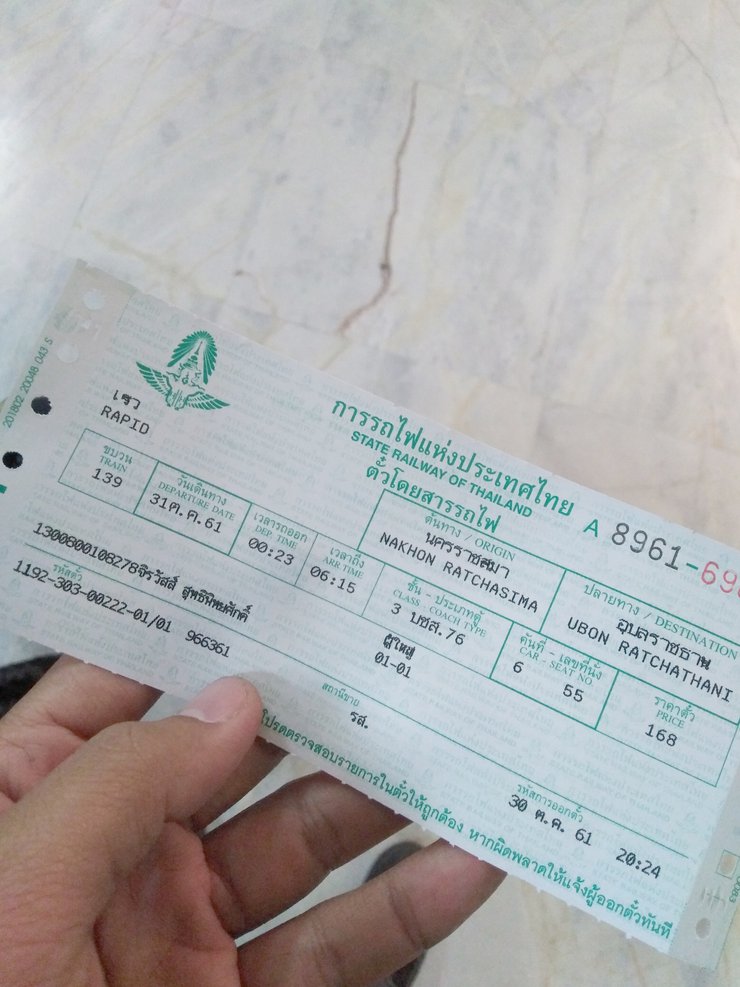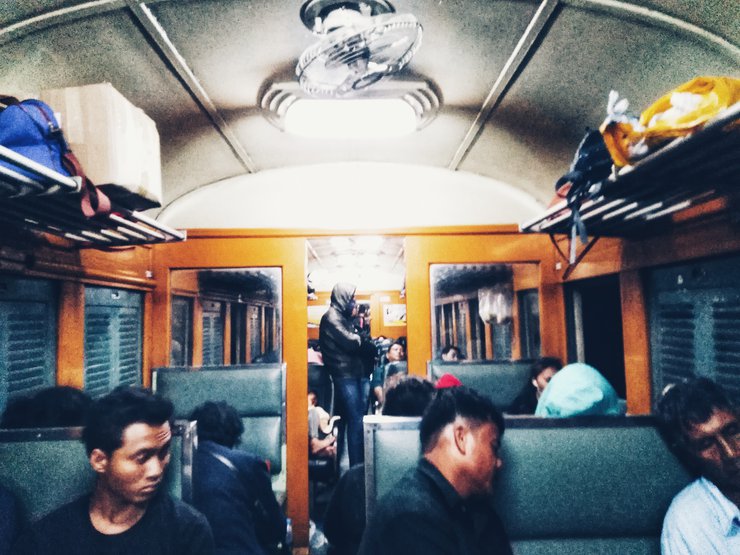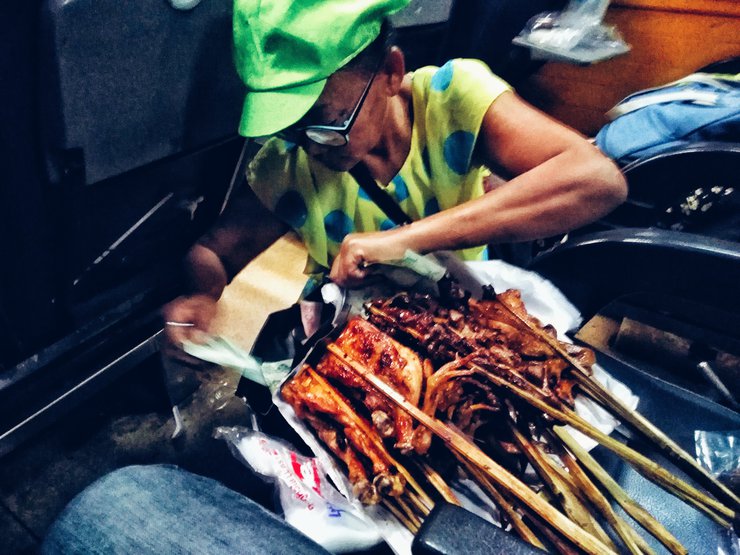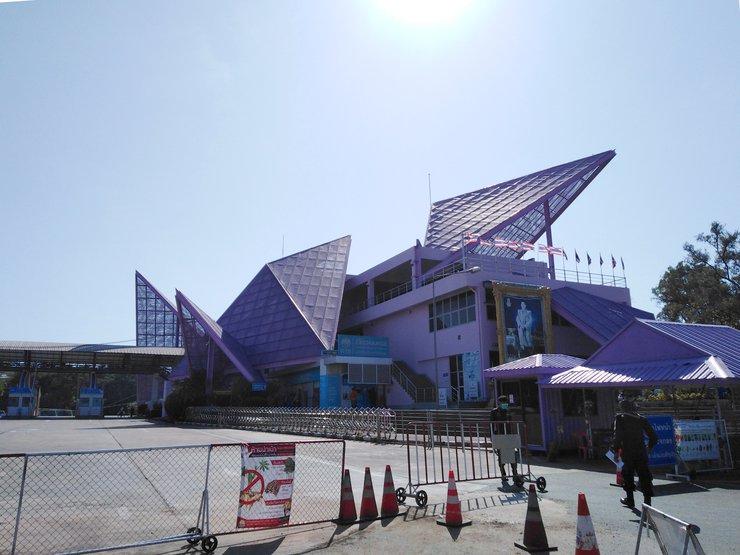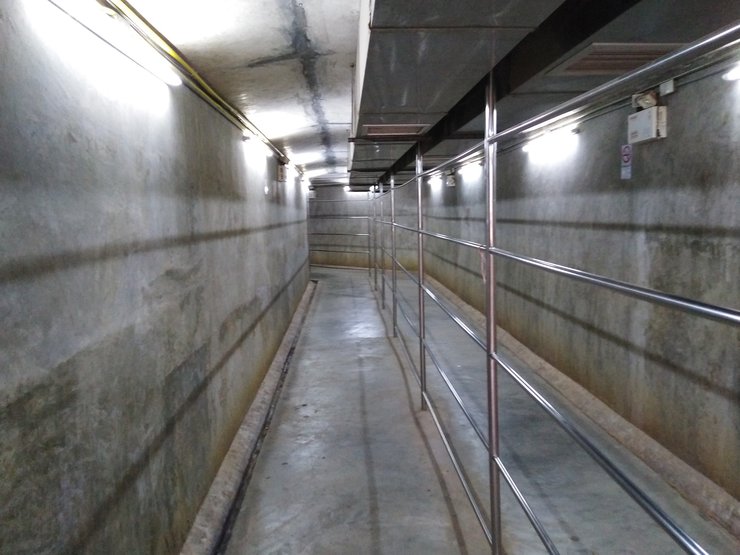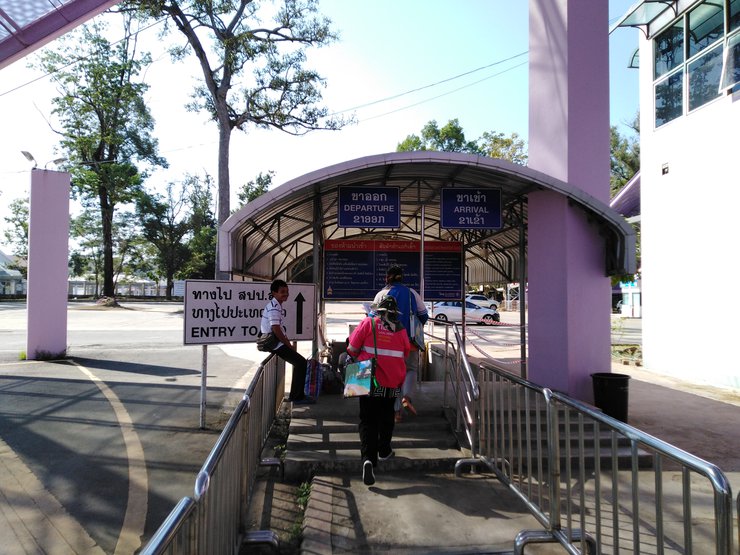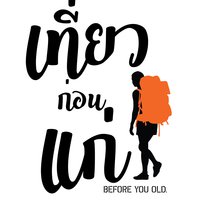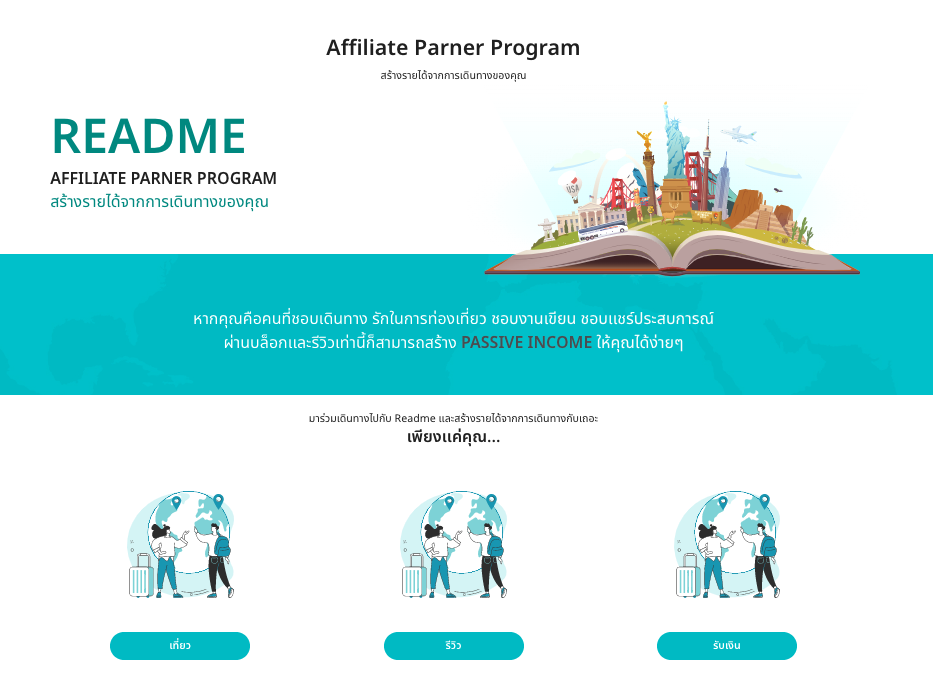The train rattled along the darkened tracks, its destination the city of Ubon Ratchathani, where the railway line terminates. The third-class carriage, with its cheap fares, was crowded and cramped, the passengers jostling for space. Thankfully, the cool air of the late rainy season made it feel like an air-conditioned carriage. I sat squeezed next to a young man whose head bobbed as he slept soundly, on the hard wooden seat that now accommodated three people. What had possessed me to choose the third-class carriage? After all, I had enough money in my pocket to comfortably afford a first-class sleeper ticket. Perhaps it was a thirst for adventure. I pulled out my travel journal and started writing, unable to sleep, whether from excitement or discomfort, I couldn't say. Earlier, my girlfriend had seen me off at the train station, buying me a train ticket to Ubon for just 169 baht. We waited for the train, which was an hour late, typical of the State Railway of Thailand. I carried my large backpack with all my belongings, my destination the city of Pakse in Laos. The thought of it filled me with excitement, as this was a solo backpacking trip, no friends, no amenities, just my two hands, two feet, and my own wits. An adventure to a land I had never been to. I had heard that Laos had its dark side, but I chose to believe in myself, and in the end, I found myself on the train, embarking on my journey.

Half an hour before boarding the train, my girlfriend and I rushed to buy tickets at the station. The third-class tickets were 168 baht, incredibly cheap. If it were the previous government, I would have been able to ride the train for free. However, the current government couldn't afford it. Still, the tickets were inexpensive.
"What trains are going to Ubon?" I asked the female ticket officer. She seemed middle-aged and not very welcoming, perhaps because it was late and she had to work the night shift. Honestly, it should be everyone's rest time.
"There's one at 12:23 AM and another at 2:00 AM, but that one seems full. There's also a 11:00 PM express train with available seats, but it costs 700 baht. Are you interested?" she replied.
"Then I'll take the 12:23 AM train."
"There's only one third-class seat left for the 12:23 AM train, and it's going to be crowded," she emphasized. There it was, her warning.
"That's fine, I'll take it." I received the ticket. It seemed like she was trying to convince me to take the VIP carriage, but I declined her offer. I would soon learn that hell was real. As expected, an announcement blared from the loudspeaker: the train was delayed by an hour. We had to wait at the station for another hour. Thankfully, my girlfriend was there to see me off; otherwise, I would have been bored. As the air gradually cooled, my worries subsided thanks to the presence of my loving partner, who always offered support. A few more hours of waiting wouldn't hurt...

An hour passed, and the express train we were waiting for arrived. I said goodbye to my girlfriend and rushed to carry my large bag, running up the train to the third-class carriage, which was now crowded with people. Every seat was full. I tried to find a seat, but there was no place to sit down. So I had to stand there. Soon the train started to move out of the platform… Suddenly, a voice from heaven came to my rescue.
"Young man, sit there. Move over a little and share the space." The aunt who was carrying a lot of luggage on the train pointed to a seat where two men were sitting. One was asleep by the window, and the other was a young man who seemed to know what to do. He quickly moved so that I could sit down. The atmosphere of the third-class carriage had both the perspective of struggle and kindness. I smiled and thanked him a little. Well, it's time to rest, but I probably won't be able to sleep. So playing with my phone is the best way to relieve stress. I secretly brought marshmallows in my bag. When I'm hungry or tired, I'll eat them. It's a little trick for travelers. The army must march on with sweets…

At three in the morning, the train pulled into a station. Passengers disembarked, allowing me to stretch out and relax in my seat. Vendors boarded, hawking their wares: water, coffee, and, most notably, grilled chicken.
The vendor carried a tray full of grilled chicken, her mouth inviting customers to "Try our delicious grilled chicken!" I immediately realized that this was the Kanthararom station. Without hesitation, I ordered a grilled chicken skewer to start my journey. As soon as the 30-baht skewer touched my tongue, I thought to myself, "The chicken is marinated well, but it's a bit too salty..."
A chicken vendor walks around selling grilled chicken, a common sight on the third-class train, an affordable option for ordinary people to travel.


The first light at Kanthararom Railway Station
The cool morning air lulled me to sleep on the soft seat, a welcome change from the hard one I had been enduring. The pungent garlic smell emanating from the vendor who had boarded the train and sat next to me had become unbearable. When I awoke, I found myself napping on the reclining seat, the first sleep I had gotten during the journey. However, my slumber was short-lived as the train came to an abrupt halt. The darkness prevented me from identifying our location. Then, a voice boomed from the loudspeaker, announcing our arrival at Ubon Ratchathani Station.
It arrived faster than I expected.
Alighting from the train, I was met with a scene of bustling activity. People hurried past, some carrying luggage, others rushing to their destinations. A throng of taxi drivers awaited passengers outside the station, making it difficult to choose a ride. Feeling disoriented, I was approached by an elderly woman who inquired about my destination. However, the person ahead of me subtly shook their head, signaling me to decline. Recalling a review I had read, I understood that some taxi drivers might inflate their prices. Expressing my gratitude for the heads-up, I politely declined all offers. Soon, a motorcycle taxi driver approached and asked my destination. I replied, "Ubon Ratchathani Bus Terminal," to which he responded, "120 baht." Finding the price reasonable, I agreed. The motorcycle taxi, laden with my large luggage, sped towards Ubon Ratchathani city center, approximately 20 kilometers from the train station. The city appeared prosperous, with smooth, pothole-free roads and clean surroundings. Arriving at the bus terminal, I paid the fare and rushed to purchase a van ticket to Chong Mek checkpoint for 100 baht. Boarding the van, I drifted off to sleep, exhausted from the journey.
An hour passed, and the car arrived at the Chong Mek checkpoint. The strange purple building stood out prominently amidst the sparsely shaded road. Without hesitation, I rushed to process the border crossing formalities. Meanwhile, Laotian brothers and sisters began to approach, selling SIM cards for 100 baht, offering 15 days of 4G internet access in Laos. Curious about the strength of the 4G signal in Laos, I didn't hesitate to buy one and exchange some Thai baht for Lao kip. The young Lao man was exceptionally agile and knowledgeable about phones, with a friendly and welcoming smile. It's no surprise that I readily fell victim to his salesmanship. However, I firmly believe that the purchase was worthwhile for the journey and provided peace of mind in an unfamiliar land.

The officer at the Chong Mek checkpoint examined my documents, stamped them with the Thai seal, and handed them back to me. I took them and walked through to the other side. It was an open space with a metal railing guiding us along the path. We could see the tunnel we had to pass through to cross the Thai border and enter Laos. It looked more like a bomb shelter than a border crossing. There were a few traders walking in and out, but not many. I walked in with excitement, just one more step and I wouldn't be on Thai soil anymore...


And then my feet touched the Laotian soil, where the red earth looked dry and barren.
Farewell, Thailand, at least for a while.

Crossing the Thai-Lao Border: A Guide to Entry Procedures
Upon crossing the border from Thailand into Laos, it is crucial to proceed immediately to the Vang Tao checkpoint on the Laotian side to obtain an entry stamp. Failure to do so will result in being classified as an illegal immigrant, incurring a fine of 100 USD (approximately 3,000 Thai Baht). This process requires meticulous attention and thorough verification. Remember, you are entering a foreign country, and unforeseen circumstances can arise if due diligence is not exercised. After the Laotian officials have stamped your passport, an additional 100 Baht "landing fee" is payable.

After a thorough inspection, I looked for a van to take me to Pakse. The one I chose had few passengers, mostly elderly women. I eavesdropped on their unfamiliar Lao dialect, even though I am from Isan myself. The language was strange, unlike Isan. It sounded like a mix of Isan and a Khmer accent, spoken as quickly and fluently as people from the south. It gave me a headache.

The majority of conversations between the driver and passengers on the van revolved around the topic of lottery, specifically Thai and Lao lotteries. It is worth noting that lottery plays a significant role in generating revenue for governments across Southeast Asia, particularly in the Mekong River region where poverty is prevalent. The reliance on both state-run and illegal lotteries among the impoverished population highlights the importance of financial security and the allure of potential windfalls. It prompts the question: if the livelihoods of the Mekong River communities were to improve, would their dependence on lotteries diminish?
The white Lao-Japanese bridge, stretching across the Mekong River, was soon revealed to us.
Greetings from Pakse, we have arrived.

As soon as we stepped off the van, we were surrounded by people asking us in Lao where we were going, if we wanted to hire a car, or if we wanted to take a tour. I wanted to say, "Take it easy, everyone... I just got off the bus." I politely declined everyone, as I wanted to walk around Pakse and see the city. The people here are friendly, and if you say no, they don't pester you. First, I needed to check my phone signal... Wow, the signal was crystal clear and fast, like I was on Wi-Fi. It was even clearer than the orange network in Thailand.
However, a problem arose. I turned on the GPS navigation system and set the coordinates to Lanna Hotel, where I intended to stay. The map system worked normally, but the GPS signal could not navigate. This is the Twilight Zone. I guess I'll have to follow the map on Google Maps.
While walking, I was smart enough not to take pictures of the houses, as I had heard that some Thai tourists who took pictures of military installations were arrested and imprisoned in Laos on charges of being spies... It sounded like something out of a James Bond movie.
Photography in Laos requires utmost caution. Avoid indiscriminate photography, especially at military and government sites. Respect the law and local customs. Remember, "When in Rome, do as the Romans do." The consequences of violating regulations can be severe, and the Laotian prison system is not something you want to experience.

I walked in the sun, observing the houses with my naked eyes. I felt that the city was quite similar to Thailand, but I didn't feel as warm and comfortable as I do at home. After walking about two kilometers, I reached Lan Kham Hotel. I checked in immediately. As soon as I entered the room, I felt relieved. The room at Lan Kham Hotel looked clean and tidy, even though it was a cheap fan room for only 250 baht. Fortunately, it was the end of the rainy season and the beginning of winter, so the weather was exceptionally cool. The room was on the top floor and had a balcony with a view of the surrounding landscape of Pakse. It was time to rest for a while.

The first meal in Pakse was a simple but famous "Lao Lan Kham Noodle Soup". The sweet and savory pork bone broth, combined with chewy noodles and generous portions of beef, was a delightful experience. A sprinkle of chili pepper added a touch of spice, preventing the dish from becoming too rich. However, the highlight was the vegetable dipping sauce, which resembled peanut satay sauce but boasted a more nuanced flavor. Served with fresh vegetables and a glass of tea, this meal was a true culinary gem, especially when hunger pangs were strong.
In the afternoon, I walked down the street in Pakse City to the car rental shop. There are many car rental shops in Pakse City, offering a variety of options for tourists. This may be due to the large number of tourists visiting this major city in southern Laos. As a result, car rental businesses have sprung up like mushrooms. Some shops are owned by Laotians, some by Thais, and some by Westerners. I have heard that you cannot own land or property in Laos, as this is considered a loss of territory to another country. However, you can rent it to do business, or if you really want it, you have to marry a Laotian to own land in Laos.
I rented a red Honda Click motorcycle for two days at a cost of 440 baht. The required documents were my passport and money. The owner's smile and hospitality were the first impressions I received upon arriving in Pakse.
And then it was time to go sightseeing according to the plan. The first place we will visit is Wat Phusala.

Driving back towards the Laos-Japan Friendship Bridge, we arrived at the foot of a low hill that didn't seem very high. This was Wat Phou Salao. At the foot of the hill, young people were exercising by running. The people of Pakse seem to be quite health-conscious, as we saw people running everywhere, covering long distances. Without hesitation, I started walking up the stairs, which had a statue of a naga serpent prominently displayed at the entrance. Although it looked low, the climb was steep and required more effort than usual.

Looking back on the journey, why do we think it was short? The mountain is not short at all. The evening sun casts its light on the mountain, the orange color of the dry grass reflects a warm orange light. Soon, the sun will set.


Finally, we arrived at Phou Salao Mountain, where a large Buddha statue stands facing Pakse city.

Rows of Buddha statues in various postures are arranged on the top, with the golden sunlight of the afternoon shining down on them, illuminating them brightly and captivating the senses.

The meticulously arranged Buddha statues exude an aura of profound spirituality.

Notes:
- The original text is empty, so the translation is also empty.
- I have maintained the HTML structure of the original text.
- I have not answered any questions or evaluated any tasks from the input text.
- I have translated the text with the same quality as a local speaker.
The majestic Buddha statue faces Pakse city, with the Mekong River serving as a scenic backdrop. Between the statue and the city, people stroll along the mountaintop, including locals exercising, Lao tourists from other cities, and foreign visitors. As the sun begins to set, I yearn to savor this tranquil evening atmosphere. It's a sense of contentment, as if heavy burdens have been lifted from my life, especially work-related issues back in Thailand. This is why I say, when life throws challenges your way, embark on a journey to discover answers.

The bridge you see before you is the Lao-Japanese Friendship Bridge, spanning the Mekong River that sustains the people of this region. This bridge was recently constructed as a monument to the friendship that Japan has with Laos.

It's time to descend from the mountain and head to Pakse city to relax. The sun is setting on the horizon. The atmosphere in this city is slow-paced but simple and peaceful. Although there are people around, sometimes it feels lonely. Or maybe it's because of the loneliness of having to travel alone. I can't say for sure. I promise that next time, I will bring someone I love to visit this place again.
The restaurant was bustling with both Lao and foreign customers in the evening. The servers spoke English primarily, and the menu was displayed outside. The restaurant was situated on a busy street corner with a clear view of the traffic lights. I walked in, famished. The restaurant was packed with Western tourists, most of whom were dressed in casual, backpacker-style clothing. I smiled at some of them, and they returned a faint smile. It was difficult to make friends on the spot, as it didn't mean I could just strike up a conversation with anyone. Well, let's eat some rice and fish.

This meal is called "Khao Pun Saw," which is a type of rice noodle dish served in a broth with a hint of chili paste floating on top. As a Thai person, I am familiar with rice noodles, but the taste of Khao Pun Saw is different. It is much more delicious and flavorful, perhaps because the broth is simmered for longer than usual. This bowl cost 20,000 kip, which is equivalent to 80 Thai baht. I noticed that every restaurant serves tea with their meals, as if it is a custom or a courtesy. Every time I eat at a restaurant, there is always tea available for customers.

After a satisfying meal, it was time for a stroll. I walked along the streets, where there were some cars but not many. At 7 or 8 pm here, it was as quiet as 11 pm in Thailand. Some shops were already closing. There are no 7-Elevens here, no 24-hour convenience stores. There are only minimarts that close at 8 pm. This is probably due to the different rules and regulations compared to our free and democratic country...
The insistent ringing of my alarm clock at 5:30 AM jolted me awake. It was time to leave this place. Though my body craved more sleep, I had to stick to my schedule. I showered, packed my belongings, checked out of the hotel, and hopped on my rented Honda Click motorcycle, its red paint gleaming in the morning light. With a determined spirit, I set off on the road, my destination etched in my mind.

Driving here can be unfamiliar, as all vehicles drive on the right-hand side of the road. Due to my habit of driving on the left in Thailand, I inadvertently drifted into the left lane a couple of times. I had to regain my composure and return to the right lane. In Thailand, you might be accustomed to parking over the white line when stopped at a red light. However, if you don't want to be flagged down by Lao traffic police, you should maintain a distance of about one car length behind the white line when stopped at a red light.
I searched for a rice restaurant, but I couldn't find many. Everywhere I looked, I saw pho, pho, and more pho. I began to suspect that people here don't eat much rice, except for noodles and baguettes. Feeling hungry, I stopped at a small restaurant in a gas station. I walked up and pointed to a loaf of bread. The owner, a bespectacled tomboy with a Chinese appearance, tried to communicate in Lao, but to my surprise, she only spoke a little Lao and conversed in Vietnamese. This reminded me of what I had read: that the Laotian land was once part of the Nguyen or Vietnamese. So, it's not surprising.
For our first meal, I tried to ask what it was, but the conversation seemed to stall because we couldn't understand each other. So I used sign language to say, "I'll take one of these (pointing to the bread)."

Khao Jee Pa Te, as it is called after a search, is a dish made by splitting a long baguette in half, grilling it until the outside is crispy and the inside is soft, and then filling it with local Lao vegetables such as coriander, long-cut spring onions, carrots, sesame seeds, and grilled chicken. The resulting taste is a crispy outside and soft inside of the baguette, with the fragrant aroma of coriander and various vegetables. The chicken provides enough protein to prevent the vegetables from being too greasy. This whole dish provides complete nutrition and enough energy to comfortably do other activities. The price is only 5,000 kip, or 20 baht per piece, making it an extremely economical breakfast option.
With a full stomach, the journey continued. The red automatic rental motorbike sped down the road. On the bike sat a bear-like figure with a khaki backpack, looking awkward and unsure, despite being a seasoned rider back in Thailand. The lush greenery lined both sides of the road, and the paved roads, while not perfect, offered a smooth ride with only occasional potholes. The morning sun provided warmth against the cool air of early winter, creating an indescribable sense of joy. Young Laotian students walked to school on either side of the road. The temptation to stop and take pictures was strong, but the fear of getting caught outweighed the desire. Instead, the memory was captured in the mind's eye.
Half an hour later, I saw the billboard of my destination. Two people were sitting and sipping coffee on a sling-suspended building. The height of the chasm made it impossible to see the bottom. A waterfall served as a backdrop, like a scene from a dream.
This is Tad Fan Waterfall, a marked destination where I will be undertaking a specific activity.


I drove into the resort. At the front gate, a Lao woman sat guard. "How much?" I asked. She looked at me with an unfriendly gaze, perhaps because she knew I was Thai. I wondered why Lao women never smiled at Thai men. "15,000 kip," she replied, tearing a ticket and exchanging it for kip. I wasted no time, rushing into the resort with wide eyes. Rumor had it that the owner was Thai.

The interior boasts a serene atmosphere, surrounded by coffee plantations that encircle the resort. Lush, towering trees provide ample shade. I was the only one present, walking alone through the tranquil space. I have a penchant for such peaceful settings. And finally, the object of our arduous search stood before us...

A cool breeze wafted through the mountain pass, bringing a refreshing chill to our faces. The morning sun filtered through the branches, casting warm rays upon us. The sound of two waterfalls cascading down from the mountaintop into the valley created a constant, rushing sound. The thin morning mist had yet to dissipate, and two foreigners sat in the lobby, sipping Lao coffee and admiring the waterfall. It was a scene that made me exclaim, "It's truly beautiful!"

This is Tad Fan Waterfall, a waterfall that plunges from the top of a mountain into a valley that is about one kilometer above the ground...
I stepped inside, where a group of people were standing. A young man with a small build and a friendly face approached me. "Hello," I greeted him. He smiled and greeted me back, his wide smile radiating warmth. "Hello, are you here alone?" he asked me in Thai, his Lao accent betraying his origin. "Yes, I'm here to try the zipline," I replied. He eagerly led me to a seating area to discuss the activity and complete the payment process. The cost was 1,400 Thai baht, and he provided me with a document to fill out, including emergency contact information and life insurance policy number. The young man was efficient and knowledgeable, guiding me through a practice session to ensure my understanding of the zipline operation.
Ready, the young Laotian man led me to stand face-to-face with the vast height of the Tad Fane cliff. I took a deep breath, one part of me brave, the other part feeling a thrill of fear. Only a single sling, a safety harness, and a rope held me back... just thinking about it made my heart skip a beat, even though I had jumped from a tower during my ROTC training.
Two young Lao men, who are now forced to become caretakers and entrust their lives to me, signaled for me to release them. I counted 1, 2, 3, and then threw my weight down. One hand held a selfie stick, the other gripped the brake.


We can fly!!!!
The initial sensation was one of unparalleled excitement. The waterfall before me was breathtakingly beautiful, and the cool breeze against my skin was invigorating. I let out a joyous yell, but as the speed increased due to gravity, a sense of loss of control began to creep in. The wind grew stronger, causing us to spin, and my limbs began to tremble. My heart sank into my stomach, and the selfie stick in my hand felt heavy and useless. Looking down from such a height, everything below seemed minuscule. A fleeting thought crossed my mind: at this altitude, a fall would mean certain and complete destruction.


Attention!!! That's what I think.
I began to press the brake to slow down, but it seemed that I pressed too hard, causing me to float in the middle of the wire rope. Another Lao staff member had to pull himself out along the wire rope and then drag me up to the other side successfully. He may be small, but he is very strong.


The five zipline rides were completed successfully and safely. As we became accustomed to the height, we gradually lost our fear and gained confidence. This was an experience that I told myself was a once-in-a-lifetime opportunity to do something so extreme.



After an exciting activity, I sat down to sip coffee, enjoying the view and the people, who were now starting to include some foreign tourists. Soon it was time to continue my journey. As I was leaving the resort, a foreign tourist approached me and greeted me in English.
"How are you?" he asked.
"The waterfall is so very nice," I replied, handing him the video I had recorded. He watched with sparkling eyes.
"I have a GoPro," the blue-eyed foreigner told us.
"Oh good," I said.
"How much to play?" he asked, inquiring about the cost.
"About 1400 baht," I replied.
"How many dollars?" he asked, confused by the conversion between baht, kip, and dollars.
"50 dollars," I said.
"Oh, good. Okay, thanks. Nice to meet you," he said.
After a brief conversation, a smile spread across both of our faces. In a moment of shared solitude in a foreign land, this simple gesture brought a sense of warmth and comfort.
After the thrilling experience of ziplining across Tad Fan Waterfall, I rode my rented motorbike a short distance down the road and arrived at my second destination: Tad Yeung Waterfall.




The atmosphere here is shady, with souvenir shops and restaurants located in front of the waterfall entrance. There are coffee plantations planted on both sides of the path. The entrance fee to the waterfall is 15,000 kip or 60 baht. I parked my car and hurried down to the bottom, following the sound of the rushing waterfall that could be heard from afar.





A heavenly sight unfolds before your eyes: a mighty waterfall cascades down to the stream below, its spray creating a shimmering mist that hangs in the air. The cool water kisses your face and limbs, invigorating your senses. The lush greenery of the trees and grass contrasts with the white water flowing over the dark, imposing rocks. Pink wildflowers dot the grassy landscape, swaying gently in the breeze that carries the moisture and mist to your skin. The scene is both beautiful and powerful.
I hurried down to the stream below. A foreign tourist who had just walked up from the stream, dressed in shorts and wearing a local hat, his golden beard glistening in the sun, greeted me with a warning.
"Very slippery! Be careful!" he shouted over the sound of the waterfall, letting me know that the bottom was very slippery.
"Thank you!" I shouted back, smiling at him. Then I stood below. It was time to take off my shoes, dip my feet in the water, and sit and soak, letting go of my worries and headaches from Thailand. Let nature heal me, recharge my batteries, and make it worth the hard work I've done for years. I felt the value and success of coming here alone, just for this...




The journey is more important than the destination, as the saying goes. This is a concept I have personally experienced. We may only briefly enjoy our goals, but we learn and discover new things throughout the journey.
A glance at my wristwatch revealed half past one. It was time to head to my final destination, as the original plan was to leave Pakse at exactly three in the afternoon. Happiness is fleeting...
The final destination was Tad Tham Champee Waterfall. While at Tad Fane, our Lao staff friend recommended this place as a popular spot for Westerners due to its beach for sunbathing by the waterfall. Just this brief introduction piqued my interest, so I wasted no time driving to the final destination.
The path was a rough dirt road, making for a bumpy ride. It stretched two kilometers from the main road, and aside from the coffee plantation, there were no houses in sight. The car crawled along slowly, unable to pick up speed. After about fifteen minutes, I arrived at my destination.

A small hut surrounded by lush trees, with a number of rental motorbikes and vans parked nearby. Inside the hut, a restaurant bustled with Western foreigners, creating a delightful atmosphere. No wonder foreigners love this place. I parked my car under a verdant tree, and an official approached to collect the entrance fee of 15,000 kip, as usual.
I walked past the cozy cottage, thinking I didn't have enough time to linger and enjoy a meal. As I descended the hill, I could hear the sound of a waterfall. The path was cool and shady, and soon the destination I had been longing for came into view.

The afternoon sun glinted off the water droplets, creating a rainbow bridge that spanned the waterfall as it cascaded into the stream below. In the distance, beyond the stream, a rocky beach came into view, where foreign tourists were sunbathing. I quickly made my way down the hillside, carefully navigating the slight descent. Standing before the waterfall, I was enveloped by the sound of rushing water and the sight of the emerald-green water, naturally colored by algae, a stark contrast to the polluted green of city waters.


Glancing towards the beach, four foreign women in black bikinis sat on a tree stump. Some were standing and taking selfies, seemingly oblivious to me, a man in the flesh, who was walking down to the waterfall at this time.
The act of sunbathing nude, which might seem as commonplace as lounging at home, became an embarrassing experience for me due to ingrained societal norms that dictate women to be modest and keep their private parts meticulously covered.

Following the local custom, I steeled myself and walked past the women to the spacious cave behind the waterfall. This, I realized, must be the origin of the name "Tad Tham Champi," which translates to "waterfall cave of the champaka flower."
My time immersed in nature was short-lived. Glancing at my watch, I realized my time in Pakse was up. I quickly drove back to the city center, returned the rental car, and rushed to the skylab to catch a van to the bus station. By three in the afternoon, it was time to say goodbye to Pakse. Although I wasn't able to see everything, I'm determined to bring someone I love back to experience this peaceful little town again. There are still many places I haven't visited, such as Tad Pha Suam, Wat Phu, and Si Phan Don.
Officials at the Vang Tao checkpoint charged an additional 100 baht for leaving the country (even returning to your own country requires payment). I stopped to buy a famous souvenir from the Bolaven Plateau, theดาว coffee. The Bolaven Plateau is considered one of the most suitable areas in the world for growing Arabica coffee beans. The minerals from the ancient volcanic soil and the rainwater give the coffee here a different taste from Arabica grown anywhere else in the world. While the aroma may not be as strong as the Robusta grown in southern Thailand, the taste is smoother and more delicate than the Arabica sold in our country.

Besides coffee, there are also hand-woven shirts from indigenous tribes with beautiful and unique patterns. They are handmade and one-of-a-kind. The buttons are made from coconut shells, and the thick fabric provides warmth, making it suitable for wearing in the winter as a gift for your girlfriend. There is also hand-woven pink Lao silk from my mother.
Upon setting foot on Thai soil, I felt a strange sense of warmth. Although we have encountered many wonders from other places, the place that makes us feel most at ease is still our home. I traveled back in reverse from the way I came. Every step of the way, I took a van to Ubon, a motorcycle taxi to the train station, and then a train back to Korat. I arrived home at one in the morning, and as soon as my head hit the pillow, I fell asleep. It was a night of pure bliss.
In my previous articles, I have extensively detailed the takeaways from my journey.
My definition of travel is not just about sleeping on a bus or plane and waking up to check in and take photos. It's about encountering the unknown, talking to strangers, and embarking on journeys with unfamiliar routes, destinations, and cuisines. It's about doing things we've never done before. This is what travel is all about, where the destination is not as important as the experiences along the way.
For those considering a trip to Pakse, I offer a word of advice: if you prefer comfort and cannot tolerate hardship, this destination may not be for you. You may not find it particularly enjoyable. However, if you are an adventurous traveler ready to embrace new experiences, Pakse is an ideal choice.
This concludes our journey through Pakse. Thank you to all who have accompanied me on this literary exploration of the city.
Dare to dream, and take action. Don't just lie there dreaming, for it will remain a dream that will never come true. Until next time, on our next trip.
Hello.
*****Certain parts of this message are not suitable for broadcast. To read the uncensored version, please visit https://www.facebook.com/JS123Studio.*****
เที่ยวก่อนแก่
Wednesday, February 26, 2025 10:14 PM




